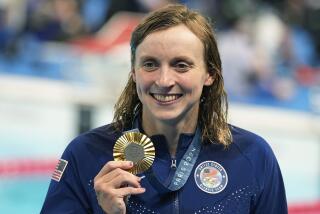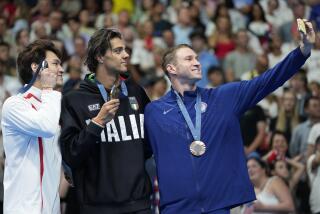Neilson, Babashoff Took Gould’s Luster
- Share via
Australia’s Shane Gould was as close to Mark Spitz as women’s swimming had in 1972. Although she was only 15, she was predicted to win five gold medals. But the U.S. women were not convinced. Before the Olympics, they had T-shirts made for themselves that said, “All That Glitters Is Not Gould.”
They were right. Gould won her first race, the 200-meter individual medley, but, on the next day, she finished a stunned third behind two Southern California teenagers, Sandra Neilson, 16, of El Monte, and Shirley Babashoff, 15, of Fountain Valley. For Gould, who would rebound to win two more gold medals and a bronze, it was her first freestyle loss in three years.
Today, Sandra Neilson-Bell still shows the tape of her victory to her swim students in Austin, Texas. The wide-eyed students never seem to mind that the black and white footage is nearly 30 years old. They slide to the edge of their seats and monitor the race as if it were live, erupting into cheers as she propels herself to victory.
“When the kids watch, they always say, ‘Do you win, do you win?’ ” Neilson-Bell said. “When they see that I do, they scream, ‘All right!’ ”
And Neilson-Bell never grows tired of using that clip as a motivational tool for her students, many of whom are just learning to swim. She won two more gold medals in relay races.
She tapped into those performances as inspiration for a 1984 comeback that ended a 12-year layoff at the national level and lasted until 1996.
Her second career broke many personal barriers--she became the first woman over 30 and 35 to break one minute in the 100 freestyle and narrowly missed making the ’88 Olympic team--and also demonstrated that women over 30 could still compete at the highest level. Many have followed suit.
Her return to international competition was spurred by Keith Bell, a highly successful swim coach and sports psychologist who later became her husband. She felt she had nothing left to accomplish after the ’72 Olympics, but said Bell forced her to reset her goals and challenged her to be better than before.
Now a mother of four and grandmother of two, Neilson-Bell spends much of her free time coaching swimmers of all age. She gets her biggest reward teaching adults to swim.
“It’s something I always wanted to do,” said Neilson-Bell, inducted into the International Swimming Hall of Fame in 1986. “See them take that big step and learn how to swim.”
The ’72 Olympics marked the beginning of Babashoff’s international swimming career. She won a gold medal and two silvers in Munich before resuming classes at Fountain Valley High. She returned to the ’76 Games in Montreal, taking home another gold and four silvers.
Babashoff was narrowly defeated there in the 800-meter freestyle by East German Petra Thumer--the second consecutive Olympics in which she entered an individual event as the world record holder but failed to win--and then publicly accused the East Germans of using steroids. Those involved in the sport had suspected the East German swimmers were using performance-enhancing drugs, but Babashoff was one of the few who spoke out. As a result, a large segment of the press called her “Surly Shirley.” However, she was later vindicated by revelations in Germany that thousands of athletes, including Olympic swimmers, were given daily “steroid cocktails.”
In addition to the eight medals Babashoff won at two Olympics and two world championships, she won 27 national championships, set six world records and was a member of five world record relay teams. Today, she is a postal worker living in Fountain Valley with her 16-year-old son, Adam, said Babashoff’s sister, Debbie.
Although she could not be reached for an interview, she told the Orange County Register in 1996 that she prefers leading an inconspicuous life. “It gets real awkward,” she said. “You just want to be normal, and you can’t. You just want to do what you love, and you can’t. Everyone knows you, and it sets you apart. It’s very isolating. To this day, they’ll introduce me at work as ‘Shirley, the Olympic swimmer.’ It’s like all the things I’ve done the past 20 years don’t count.”
More to Read
Go beyond the scoreboard
Get the latest on L.A.'s teams in the daily Sports Report newsletter.
You may occasionally receive promotional content from the Los Angeles Times.






